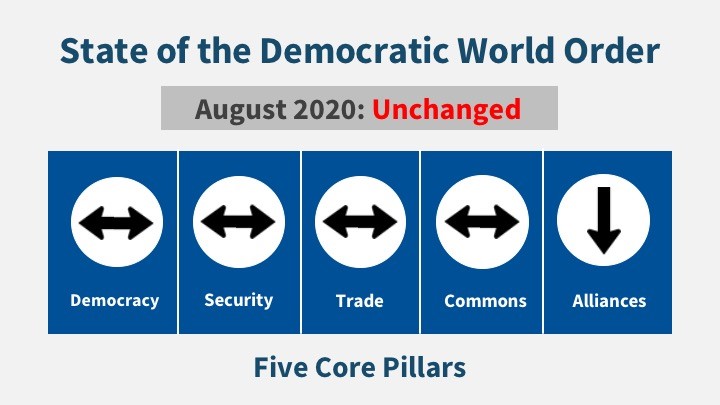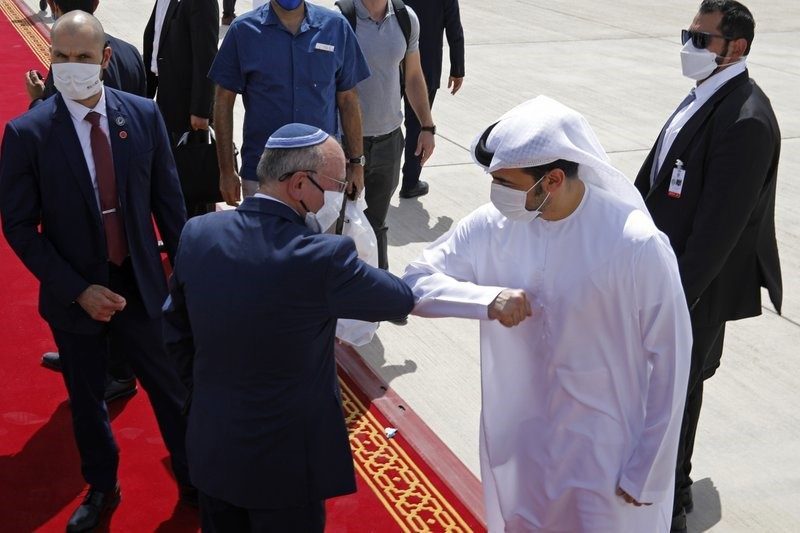Reshaping the order
This month’s topline events
Middle East milestone: With US backing, Israel and the United Arab Emirates announced a historic peace agreement, as the UAE agreed to normalize diplomatic relations while Israel halted further annexation of the West Bank. Bahrain indicated that it would soon follow. The UAE and Bahrain will become the third and fourth Arab nations to formally recognize Israel, after Egypt and Jordan. Palestinian leaders criticized the agreement as a betrayal of the Palestinian cause, but Saudi Arabia broke its initial silence and signaled its support.
- Shaping the order. The deal signals the formation of a growing anti-Iran coalition and reflects a strategic setback for Tehran, which poses an ongoing threat to stability in the Middle East. Improved relations between Israel and the Gulf states could also boost momentum for negotiations on the Palestinian conflict, foster economic and entrepreneurial activity, and help counter radicalization as the region faces a growing youth bulge.
- Hitting home. A coalition of allies working together to counter Iran—a designated state sponsor of terror—could help protect against threats to American citizens.
- What to do. Washington should leverage these breakthroughs to enhance regional security and intelligence cooperation against Iran, while working to restore credibility with the Palestinians to jumpstart the peace process. The United States should also support greater economic engagement between Israel and Arab states.
Russia eyes Belarus: Belarus President Alyaksandr Lukashenka faced a mass popular uprising as tens of thousands of Belarus citizens demanded his resignation after what was widely viewed as a sham presidential election. Lukashenka, often referred to as “Europe’s last dictator,” stood his ground as security services remain loyal, and Russian president Vladimir Putin stated that Russia was ready to intervene on behalf of the regime in Belarus “if necessary.”
- Shaping the order. Lukashenka’s downfall would represent a significant victory for pro-democracy forces—a prospect, especially in a former Soviet republic—that appears to have alarmed Putin. Despite tensions between the two leaders, Putin is eager to keep Lukashenka in power to maintain Russian influence and prevent a democratic revolution, building on his successful efforts to bolster pro-Russia dictators in Syria and Venezuela.
- Hitting home. Russia’s support for Lukashenka is consistent with its activities to undermine democratic norms across the globe, including in the United States, where the intelligence community is warning that the Kremlin is once again actively seeking to influence the outcome of this fall’s presidential election.
- What to do. The White House should work with European allies to impose sanctions against Belarusian security officials, demand the release of opposition leader Maria Kolesnikova, and warn Russia against any direct or indirect intervention on behalf of Lukashenka, while calling for new elections under the auspices of the OSCE.
Taiwan in the crosshairs: Tensions rose as China’s People’s Liberation Army held live-fire exercises that its state media said was directed at Taiwan and the United States, while Taiwanese President Tsai Ing-wen sought stronger US security assurances and called for an alliance of democracies to defend against “aggressive actions.” Washington responded by approving the sale of F-16 fighter jets, navigating warships through the Taiwan Strait, and sending Health and Human Services Secretary Alex Azar to Taipei—the highest-ranking official US visit in decades.
- Shaping the order. In the wake of China’s recent crackdown in Hong Kong, Beijing’s increasingly bellicose rhetoric toward Taiwan has raised concerns about how far it is willing to go in attempting to “reunify” Taiwan with the mainland. Any serious Chinese provocation would raise the specter for great power conflict in the Taiwan Strait..
- Hitting home. If China decides to move against Taiwan, US military forces would almost certainly engage in combat to contribute to Taiwan’s self-defense. Conflict with China could have a devastating impact on the US and global economy.
- What to do. The United States should join allies in Europe and the Asia-Pacific to present a united front and replace its policy of “strategic ambiguity” with “strategic clarity” to deter potential Chinese aggression.
“[T]he Indo-Pacific region…is where the shape of the international order of tomorrow will be decided. We want to help shape that order—so that it is based on rules and international cooperation, not on the law of the strong. That is why we have intensified cooperation with those countries that share our democratic and liberal values.”
– German Minister of Foreign Affairs Heiko Maas

State of the Order this month: Unchanged
Assessing the five core pillars of the democratic world order
- Democracy (↔) – Large waves of pro-democracy demonstrations continue across Belarus. Russian opposition leader Alexi Navalny was poisoned on a flight from Siberia with a Soviet-era chemical nerve agent, as Western governments called for a full investigation to determine Russian accountability. China sanctioned several US members of Congress and the heads of Human Rights Watch, Freedom House, and the National Endowment for Democracy, among other entities, for “intervening in Hong Kong affairs.”
- Security (↔) – While tensions increased in the Taiwan Strait, China launched four ballistic missiles in the South China Sea and engaged in what India deemed “provocative military movements” on the Sino-Indian border. Competing claims on gas reserves in the Mediterranean led to a naval collision and growing animosity between Greece and Turkey. Still, the overall security of the order remained stable.
- Trade (↔) – The United States imposed new tariffs on Canadian aluminum, as President Trump accused Canada of “taking advantage of us as usual,” while Prime Minister Trudeau vowed to retaliate. Australia, India, and Japan agreed to launch an initiative to improve supply chain resilience in the Indo-Pacific, an effort that appears aimed at reducing economic dependence on China. Taiwan expressed interest in a bilateral free trade agreement with the United States, as it lifted import restrictions on US meat.
- Commons (↔) – Despite US opposition, a Chinese official was elected to sit on the International Tribunal on the Law of the Sea, a UN-affiliated agency responsible for cases concerning maritime claims. Russia approved a questionable COVID-19 vaccine, while the Trump administration stayed out of the World Health Organization’s COVAX initiative—a collective effort of more than 170 nations to develop and distribute a vaccine. Still, the overall impact on the global commons remained unchanged.
- Alliances (↓) – Germany, France, and the UK rebuked the United States over its effort to reinstate UN Security Council sanctions on Iran, as Secretary of State Pompeo accused America’s closest allies of “sid[ing] with the ayatollahs.” Sixty-seven nations, including several US allies, defended the International Criminal Court against sanctions imposed by the US for the ICC’s launch of an investigation of alleged war crimes by American troops in Afghanistan. Japan expressed hope for joining the Five Eyes intelligence alliance, citing shared concerns about China. With several leaders declining to attend, President Trump again postponed this year’s G7 Summit, until after the US election.
Strengthened (↑)________Unchanged (↔)________Weakened (↓)
What is the democratic world order? Also known as the liberal order, the rules-based order, or simply the free world, the democratic world order encompasses the rules, norms, alliances, and institutions created and supported by leading democracies over the past seven decades to foster security, democracy, prosperity, and a healthy planet.
This month’s top reads
Three must read commentaries on the democratic order
- Richard Haass and David Sacks write in Foreign Affairs that America must provide strategic clarity on Taiwan to effectively deter future conflict with China.
- Aaron Friedberg argues in Foreign Affairs that a more effective strategy to deter China from its current path will require democratic nations to remain strong and united.
- Anders Fogh Rasmussen, writing in Japan Today, contends that the COVID-19 pandemic has increased the urgency for a global alliance of democracies to counter rising autocracies.
Action and analysis by the Atlantic Council
Our experts weigh in on this month’s events
- Barry Pavel and Matthew Kroenig, writing for The New Atlanticist, commemorate the legacy of Brent Scowcroft, a man who transformed US national security and the world over a lifetime of public service.
- Dan Fried and Brian O’Toole, writing in the Atlantic Council’s Ukraine Alert, call on the European Union, the United Kingdom, and the United States to work together to support the democratic movement in Belarus.
- Chang-Ching Tu, in The New Atlanticist, highlights Taiwan President Tsai Ing-wen’s focus on strengthening cooperation with allies and advancing global democracy.
- Will Wechsler, in The New Atlanticist, suggests the Israel-UAE agreement is a strategic victory for all sides except Iran.
- In a new Atlantic Council publication, Hans Binnendijk, Sarah Kirchberger, and Christopher Skaluba analyze rising transatlantic concerns about China and potential areas for democratic coordination.
- Matthew Kroenig writes in Foreign Policy that Washington needs to set clear goals for competition with China and a corresponding strategy to achieve these goals.
- Paul Miller, in Law & Liberty, analyzes the rise of international liberalism post-war, calls for a recommitment to the ideals of freedom, safety, and prosperity.
__________________________________________________
The Democratic Order Initiative is an Atlantic Council initiative aimed at reenergizing American global leadership and strengthening cooperation among the world’s democracies in support of a rules-based democratic order. Sign on to the Council’s Declaration of Principles for Freedom, Prosperity, and Peace by clicking here.
If you would like to be added to our email list for future publications and events, or to learn more about the Democratic Order Initiative, please email ajain@atlanticcouncil.org.
Image: Israeli National Security Advisor Meir Ben-Shabbat elbow bumps with an Emirati official as he makes his way to board the plane to leave Abu Dhabi, United Arab Emirates September 1, 2020. REUTERS/Nir Elias/Pool
